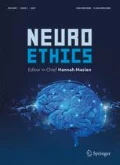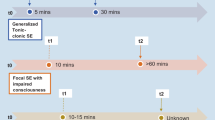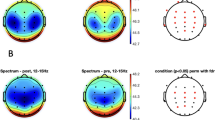Abstract
Recent progress in neurosciences has improved our understanding of chronic disorders of consciousness. One example of this advancement is the emergence of the new diagnostic category of minimally conscious state (MCS). The central characteristic of MCS is impaired consciousness. Though the phenomenon now referred to as MCS pre-existed its inclusion in diagnostic classifications, the current medical ethical concepts mainly apply to patients with normal consciousness and to non-conscious patients. Accordingly, how we morally should stand with persons in minimally conscious state remains unclear. In this paper, I examine whether the notion of human dignity could provide us with guidance with the moral difficulties MCS gives rise to. More precisely, I focus on the question of whether we are justified in holding that persons in minimally conscious state possess human dignity.
Similar content being viewed by others
Notes
The Universal Declaration of Human Rights, the International Covenant of Economic, Social and Cultural Rights, and the International Covenant on Civil and Political Rights.
They usually maintain that the meaning of dignity is exceedingly obscure or that the notion does not add anything to the value categories they accept but is only another name for values like autonomy or respect for persons (see, for example, [2]).
I now sidestep philosophical questions concerning whether there is a necessary connection between being aware of one’s environment and being aware of one’s self.
We might of course have actions that are dignified as compared with how persons in minimally conscious state can act and achievements in a similar sense. How reasonable that kind of talk would be is a further example of a philosophical problem MCS gives rise to.
For example, Warren [11] bases the moral status of humans on moral agency and in the case of humans who are not moral agents on sentience. As all persons in minimally conscious state are not moral agents in any plausible sense, on Warren’s view their moral status would assumedly be based on sentience. However, it is arguably implausible that mere sentience could ground the kind of moral regard human dignity is commonly taken to merit. Accepting that it would, would commit one to the incredible view that all sentient beings should be treated in a way that possessing human dignity deserves.
Participants of those discussions have however not focused on MCS. Therefore, whatever they are logically committed to, by referring to their views I do not mean to posit any stands concerning the human dignity of persons in minimally conscious state to them.
I will take this list as my point of departure but for the sake of brevity will speak only about rationality. Unless otherwise stated, by ‘rationality’ I below refer to all entries of the list.
The degree of rationality can also vary significantly among persons who possess that property. If human dignity is based on the property of being rational, it can be asked, why would the more rational always have equal dignity with the less rational (see, for example, [18])? If it is maintained that a certain degree of rationality is sufficient for equal human dignity, how is the level defined? As this problem does not affect the main argument of this paper, I now put it aside.
It is controversial whether nonhuman animals are capable of moral action or only of ‘pre-ethical’ behavior (see, for example, [21]).
Someone might object that though nonhuman beings can be rational, human rationality merits special moral regard because rationality is of more value to humans than it is to nonhumans. It is however not clear that rationality is of more value to humans than it is to nonhumans. Furthermore, this objection appears to give rationality only an instrumental role. At least until the nature of the ultimate value to which rationality is a means is explicated, the criticism remains too obscure to be plausible.
For example Lee & George ([7], p. 176) stress that while membership in the species Homo sapiens is sufficient for full moral worth it is not “in any direct sense” the criterion of moral worth.
Someone might of course want to limit human dignity to all and only those beings that have the property. If, however, it is taken that all humans have human dignity and the value is to help us with the moral problems of MCS, even those humans who lack rationality need to have the special dignity. Those who want to defend the view that human dignity does not extend to nonhuman beings that lack rationality also need to find out a way of limiting dignity to only human non-rational beings. But those who only want to focus on MCS and who are satisfied with extending human dignity to persons in minimally conscious state whatever other beings it might attain to need not address that difficulty.
Someone might object that this problem does not arise if the Kantian requirement that we must be able to universalize the maxims of our actions is employed correctly. The question of what is the correct way of formulating a/the universalization test is however notoriously difficult, and the debate on whether there is a plausible test of that kind at all is still continuing. I am unable to assess that debate here.
The problem of how Kant’s and Kantian moral theory could satisfactorily account for the intrinsic value of non-rational beings has recently been discussed especially in connection with the value of animals. For a review and criticism of the various attempts to solve the problem see, e.g., Skidmore [28]. Korsgaard [29] has more recently argued that animals’ value is dependent both on their being valued by rational agents and their lives’ mattering to the animals themselves. Applying this conception of the intrinsic value of a non-rational being into the context of MCS, if it is appropriate to do so, does not provide a satisfactory result. That is because all persons in minimally conscious state are not capable of valuing their lives in the sense that their lives would matter to them and a person in minimally conscious state need not be valued by any rational being.
In another article Lee ([12], p. 262) makes clear that in his view potentiality is important because it is an indicator of what kind of thing is already present.
An important part of Lee and George’s defense of their view consists of criticizing its rivals (see [7], p. 176 ff.). It is not altogether clear that the views Lee and George argue against are made less appealing by their objections (cf. [14]). In any case, the plausibility of the view advocated by Lee and George presupposes that there is a coherent sense in which all humans have a rational nature.
At times Lee and George would seem to fluctuate between the view that all humans have the rational capacity and that all humans have dignity because they belong to a kind with rational nature. Saying that human dignity is possessed on the basis of membership in a kind with rational nature would however beg the question of why even those members of the kind who are not rational have dignity. If all members of the human kind are to have human dignity, all humans must have rational nature. Unless of course the kind is defined to encompass all and only those who are immediately able to exercise their capacity for rationality. Then at least most persons in minimally conscious state would not have human dignity.
In light of the above considerations relating to the moral relevance of belonging to the human species, that a need, or a striving resulting from it, is human would not appear to have special moral significance. And the grounding of human dignity is in any case now assumed to be found in rationality.
Nussbaum ([32], p. 363) acknowledges this and maintains that human dignity does not extend to, for example, a person in a persistent vegetative state or to an anencephalic child.
Focusing on the problem of whether embryos have moral status, Deckers responses that the line of criticism is implausible as it presupposes that beings with mere potential do not have moral status. Deckers asks whether one’s not being the president implies that one lacks moral status and answers: “Not at all. The question of whether or not a particular human has moral status is immune from the question of whether or not that human has achieved a particular contingent status” ([30], p. 264). However, contrary to what Deckers would appear to assume, the objection does not tie having moral status to some such position as presidency. It says that one’s potentially becoming president, or being a potential president, does not imply that one already has the rights that come with the position of a president. That does not mean that lack of presidency implies lack of moral status.
This reason also excludes the view that persons in minimally conscious state have human dignity by virtue of having been rational agents.
If potentiality or dispositionality is defined in such wide terms that even the genetically defected humans who will never have normal consciousness are potentially or dispositionally rational, it is not clear how the view that several non-human animals too would have human dignity as they in some circumstances—perhaps with the help of such things as genetic modification or brain-implants,—could develop into rational beings.
The argument Ramsay [35] puts forward concerns the moral status of the handicapped, not that of persons in minimally conscious state.
For a recent discussion on arguments referring to human nature in bioethics see, for example, Buchanan [36].
Perhaps it could be maintained that even those beings the typical examples of which are not rational ought to be rational. I will not now go into that possibility.
In addition to the problem related to the coherence of the concept of species, it is hard to explain why possessing the common defining characteristics of species—particular genetic structure or particular kind of reproductive relations,—should bestow one with special moral worth.
Besides the concept of a person, the other possibilities in terms of which to formulate this type of a justification of human dignity include the concepts of an individual, a self, a subject, secular notions of the soul, etc. I am unable to examine them all here. It however seems that they face problems similar to those the justification in terms of the concept of a person was shown to confront above. As they do not, as yet at least, have clear enough contents, referring to them will rather raise additional difficulties than be of help in defending the doctrine of human dignity.
Also Levy ([40], p. 213, 216), declaring to play the role of a devil’s advocate, suggests that the rootedness of morality in our evolutionary history might give us reason to extend the highest form of moral considerability to members of our own species and continues that it may be that our moral emotions are inevitably triggered by conspecifics.
Deckers does not speak about dignity but about moral status that implies meriting relevantly similar moral regard that having human dignity is usually taken to deserve.
Deckers ([30], p. 268) maintains that Greenpeace activists’ risking their life in their campaign to save whales must be interpreted as a provocative and hyperbolical way of emphasizing that whales deserve almost as much moral regard as humans, not as implying that we should regularly put our lives on the line for the sake of whales. But why should we see this case in terms of the dichotomy of provocative emphasizing of whales’ moral value and our putting our lives regularly on the line for the whales. Furthermore, the group of such Greenpeace activists does not exhaust the persons who are not inclined to favor our own species.
To say that persons like those in minimally conscious state could be useful as a source of spare parts for the fitter would be incompatible with bestowing the former with human dignity.
In a similar vein, after acknowledging the fact that all humans are not rational Sulmasy [45] concludes that instead of rationality human dignity must then be based on mere species membership. The problems with that view were already mentioned above.
Dennett understands human dignity in a wide sense in which it encompasses several of the central values of our “tradition”.
Whether it could be of more worth to us than solving the moral problems in terms of values like health, wellbeing, justice, and autonomy is a question that cannot be examined within the limits of this article.
References
Fins, J.J. 2005. Rethinking disorders of consciousness: new research and its implications. Hastings Center Report 35: 22–24.
Macklin, R. 2003. Dignity is a useless concept. British Medical Journal 327: 1419–1420.
Beyleveld, D., and R. Brownsword. 2001. Human dignity in bioethics and biolaw. Oxford: Oxford University Press.
Burns, L. 2008. What is the scope for the interpretation of dignity in research involving human subjects? Medicine, Health Care and Philosophy 11: 191–208.
Häyry, M. 2003. European values in bioethics: why, what, and how to be used? Theoretical Medicine and Bioethics 24: 199–214.
Giacino, J.T. et al. 2002. The minimally conscious state: definition and diagnostic criteria. Neurology 58: 349–353.
Lee, P., and R.P. George. 2008. The nature and basis of human dignity. Ratio Juris 21: 173–193.
Nordenfelt, L. 2004. The varieties of dignity. Health Care Analysis 12: 69–81.
Weithman, P. 2008. Two arguments from human dignity. In Human dignity and bioethics: Essays commissioned by the President’s council on bioethics, 434–468. Washington, DC.
Gentzler, J. 2003. What is a death with dignity? Journal of Medicine and Philosophy 28: 461–487.
Warren, M.A. 1997. Moral status: Obligations to persons and other living things. Oxford: Oxford University Press.
Lee, P. 2004. The pro-life argument from substantial identity: a defence. Bioethics 18: 249–263.
Nordenfelt, L. 2003. Dignity and the care of the elderly. Medicine, Health Care and Philosophy 6: 103–110.
Stretton, D. 2004. Essential properties and the right to life: a response to Lee. Bioethics 18: 264–282.
Bernstein, M. 2002. Marginal cases and moral relevance. Journal of Social Philosophy 33: 523–539.
Welchman, J. 2003. Xenografting, species loyalty, and human solidarity. Journal of Social Philosophy 34: 244–255.
Blum, L. 2007. Three kinds of race-related solidarity. Journal of Social Philosophy 38: 53–72.
Arneson, R.J. 1999. What, if anything, renders all humans morally equal? In Singer and his critics, ed. D. Jamieson, 103–128. Oxford: Blackwell.
Kraynak, R.P. 2008. Human dignity and the mystery of the human soul. In Human dignity and bioethics: Essays commissioned by the President’s council on bioethics, 61–82. Washington, DC.
Gelernter, D. 2008. The irreducibly religious character of human dignity. In Human dignity and bioethics: Essays commissioned by the President’s council on bioethics, 387–408. Washington, DC.
Rolston III, H. 2008. Human uniqueness and human dignity: persons in nature and the nature of persons. In Human dignity and bioethics: Essays commissioned by the President’s council on bioethics, 129–154. Washington, DC.
Bernstein, M. 2004. Neo-Speciesism. Journal of Social Philosophy 35: 380–390.
Goldman, M. 2001. A transcendental defense of speciesism. Journal of Value Inquiry 35: 59–69.
Dixon, B. 2007. Darwinism and human dignity. Environmental Values 16: 23–42.
McMahan, J. 2005. Our fellow creatures. The Journal of Ethics 9: 353–380.
McMahan, J. 2008. Challenges to human equality. The Journal of Ethics 12: 81–104.
Hill, T.M. 2000. Respect, pluralism, and justice—Kantian perspectives. Oxford: Oxford University Press.
Skidmore, J. 2001. Duties to animals: the failure of Kant’s moral theory. The Journal of Value Inquiry 35: 541–559.
Korsgaard, C.M. 2004. ‘Fellow creatures: Kantian ethics and our duties to animals.’ the Tanner lectures on human values. http://www.tannerlectures.utah.edu/lectures/documents/volume25/korsgaard_2005.pdf.
Deckers, J. 2005. Why current UK legislation on embryo research is immoral. how the argument from lack of qualities and the argument from potentiality have been applied and why they should be rejected. Bioethics 19: 251–271.
Graft, D. 1997. Against strong speciesism. Journal of Applied Philosophy 14: 107–118.
Nussbaum, M. 2008. Human dignity and political entitlements. In Human dignity and bioethics: essays commissioned by the President’s council on bioethics, 351–380. Washington, DC.
Wood, A.W. 1998. Kant on duties regarding nonrational nature. Proceedings of the Aristotelian Society 72Suppl.: 189–210.
Boonin, D. 2002. A Defense of abortion. Cambridge, UK: Cambridge University Press.
Ramsay, H. 1998. Distinctive moralities: the value of life and our duties to the handicapped. The Journal of Value Inquiry 32: 507–517.
Buchanan, A. 2008. Human nature and enhancement. Bioethics, forthcoming.
DeGrazia, D. 1997. Great apes, dolphins, and the concept of personhood. Southern Journal of Philosophy 35: 301–320.
Gunnarsson, L. 2008. The great apes and the severely disabled: moral status and thick evaluative concepts. Ethical Theory and Moral Practice, forthcoming.
Barresi, J. 1999. On becoming a person. Philosophical Psychology 12: 79–98.
Levy, N. 2004. Cohen and Kinds: a response to Nathan Nobis. Journal of Applied Philosophy 21: 213–217.
LaPorte, J. 2007. In defense of species. Studies in History and Philosophy of Biology and Biomedical Sciences 38: 255–269.
Mishler, B. 1999. Getting rid of species? In Species: New interdisciplinary essays, ed. R.A. Wilson, 307–315. Cambridge, MA: MIT.
Rachels, J. 1990. Created from animals: The moral implications of Darwinism. Oxford: Oxford University Press.
Dennett, D. 2008. How to protect human dignity from science. In Human dignity and bioethics: Essays commissioned by the President’s council on bioethics, 39–60. Washington, DC.
Sulmasy, D.P. 2008. Dignity and bioethics: history, theory, and selected applications. In Human dignity and bioethics: Essays commissioned by the President’s council on bioethics, 469–501. Washington, DC.
Acknowledgements
I thank Juha Räikkä, Susanne Uusitalo, and an anonymous reviewer of this journal for helpful comments on an earlier version of this article.
Author information
Authors and Affiliations
Corresponding author
Rights and permissions
About this article
Cite this article
Varelius, J. Minimally Conscious State and Human Dignity. Neuroethics 2, 35–50 (2009). https://doi.org/10.1007/s12152-008-9028-2
Received:
Accepted:
Published:
Issue Date:
DOI: https://doi.org/10.1007/s12152-008-9028-2




